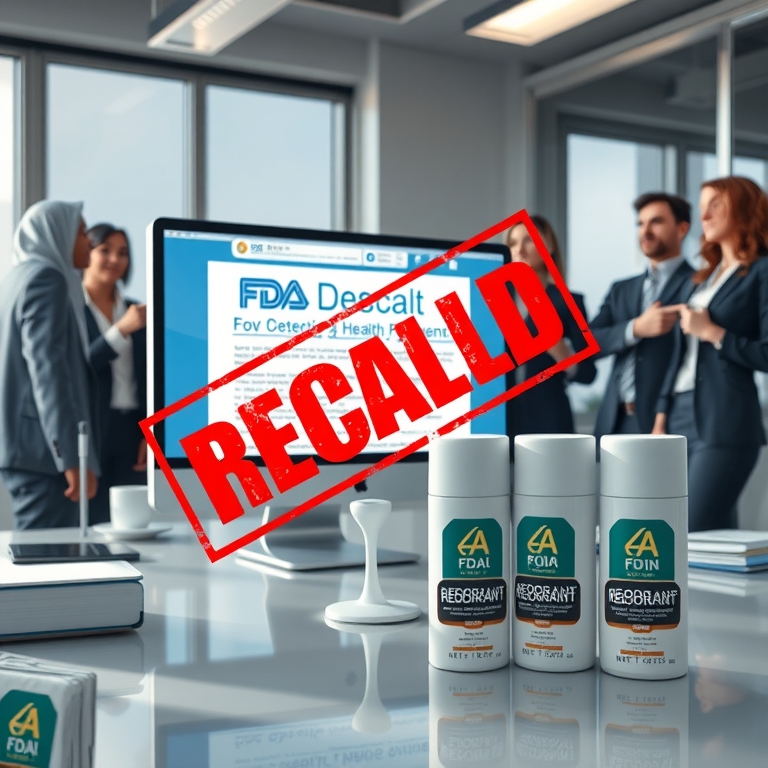In a significant development that has captured the attention of consumers and industry experts alike, the U.S. Food and Drug Administration (FDA) has announced a recall of a widely-used deodorant brand due to the presence of health risk chemicals. This recall has sent ripples through the personal care industry and raised concerns among users who trusted this household name for their daily hygiene needs. As the story unfolds, it is becoming clear that the implications of this recall extend far beyond the immediate inconvenience to consumers, potentially impacting regulatory standards, corporate responsibility, and consumer trust in the larger personal care market.
The deodorant in question, a staple in many American households, was found to contain benzene, a chemical compound classified as a human carcinogen. The FDA’s decision to issue a recall was based on findings that indicated the presence of benzene levels beyond the acceptable limits set for consumer safety. This revelation has not only brought the company’s quality control measures into question but also highlighted the ongoing challenges regulators face in ensuring the safety of everyday consumer products.
Benzene is a volatile organic compound widely used in industrial applications, but its presence in consumer products is both unexpected and concerning. Long-term exposure to benzene is known to increase the risk of developing serious health conditions, including leukemia and other blood disorders. The FDA’s swift action underscores the gravity of the situation, as the agency seeks to mitigate any potential health risks to consumers. The recall serves as a reminder of the critical role regulatory bodies play in safeguarding public health and maintaining the integrity of consumer goods.
For the company behind the deodorant brand, the recall marks a pivotal moment. Known for its strong marketing campaigns and a loyal customer base, the brand has long been synonymous with reliability and quality. However, the discovery of benzene in its products has tarnished its reputation, presenting a public relations challenge that requires careful navigation. In response to the recall, the company has pledged to conduct a thorough investigation into its manufacturing processes and supply chain practices. Executive leadership has issued public apologies and reaffirmed their commitment to consumer safety, yet the road to rebuilding trust is likely to be long and complex.
This incident also reignites the ongoing dialogue about corporate accountability in the personal care industry. With consumers increasingly demanding transparency and ethical practices, companies are under pressure to ensure that their products meet the highest safety standards. The recall highlights the importance of rigorous testing and quality assurance protocols, as well as the need for companies to proactively identify and address potential contaminants in their products. It also raises questions about the role of third-party testing and the effectiveness of current regulatory frameworks in detecting and preventing such issues before they reach the market.
Industry analysts are closely monitoring the situation, noting that the recall could have broader implications for the personal care sector. There is speculation that the FDA may consider revising its guidelines and testing requirements for deodorants and similar products, potentially leading to more stringent regulations. This could prompt other companies to reevaluate their own safety standards and quality control measures, as they seek to avoid similar scrutiny and protect their brand reputations.
From a consumer perspective, the recall has understandably led to a wave of concern and confusion. Many individuals who have relied on the deodorant for years are now faced with the challenge of finding a suitable alternative, while also grappling with fears about potential health impacts. Consumer advocacy groups are calling for greater transparency and clearer communication from both the company and regulatory agencies, emphasizing the need for timely updates and guidance to help consumers make informed decisions.
The incident also underscores the growing importance of sustainability and safety in consumer purchasing decisions. As awareness of chemical safety issues increases, consumers are likely to become even more discerning, prioritizing products that are not only effective but also safe for both personal use and the environment. This trend could drive innovation in the industry, as companies seek to develop products that meet these evolving consumer expectations.
In the coming months, all eyes will be on the FDA and the deodorant company as they work to address the fallout from this recall. The FDA’s investigation into how the contamination occurred, as well as its efforts to prevent similar incidents in the future, will be crucial in restoring consumer confidence. Meanwhile, the company’s ability to effectively manage the crisis and demonstrate meaningful improvements in its product safety practices will be key to its long-term recovery.
Ultimately, this recall serves as a poignant reminder of the fragility of consumer trust and the paramount importance of safety in the personal care industry. It is a call to action for companies and regulators alike to prioritize the well-being of consumers, ensuring that the products they depend on are both safe and reliable. As this story continues to develop, it could serve as a catalyst for positive change, driving the industry toward higher standards and renewed dedication to consumer health and safety.

Leave a Reply